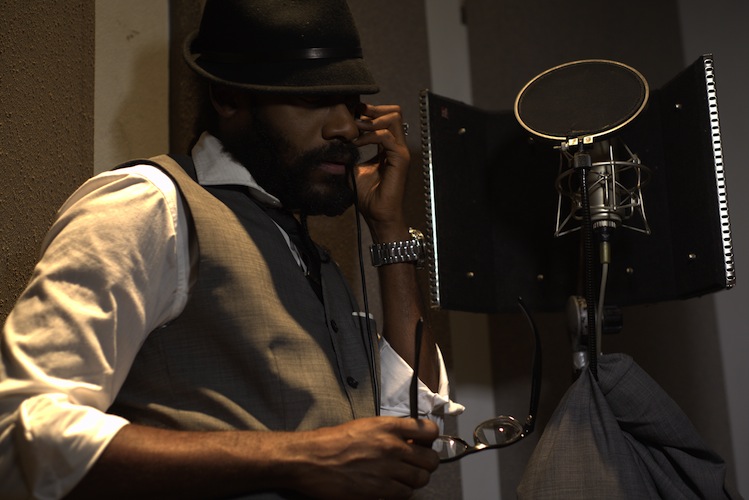Fuse Interview: Tarrus Riley — “I sing not for the chart, but for the heart”
Just in time for Valentine’s Day, Tarrus Riley and his Dean Fraser-led Black Soil Band are touring, and the group is coming to Revere’s Wonderland Ballroom tomorrow.
By Noah Schaffer
Ever since he burst on the scene a decade ago, Tarrus Riley has set the standard for quality and integrity in reggae. His hits like the ladies’ anthem “She’s Royal” have yielded him an international reputation sustained by a hard work ethic, a continued dedication to producing uplifting music and strong marketing savvy. Check out the infectious video frequent collaborator Nisha Rebel made for Riley’s smash “Gimme Likkle One Drop:”
While his 2012 LP Mecoustic spotlighted his more intimate side, the forthcoming “Love Situation” is a tribute to the rocksteady era which dominated Jamaican music in between the ska and roots reggae eras. Just in time for Valentine’s Day, Riley and his Dean Fraser-led Black Soil Band are touring, and the group is coming to Revere’s Wonderland Ballroom on Friday, Feb. 7. (The musicians will appear at New York’s massive ‘Ladies Ball — Love Satisfaction‘ rock revue the next night). While rushing to a sound check he caught up with ArtsFuse to answer a few questions.
Arts Fuse: A lot of reggae albums are just collections of singles, but you seem to try for a different concept with each new LP.
Tarrus Riley: Yeah, definitely – that’s how albums should be. I think about the albums that inspired me – Buju Banton’s Til Shiloh, Bob Marley’s Kaya and Exodus — these albums are concepts. A single is a single but an album is a concept. It should be something special.
AF: Love Situation pays respect to the wonderful foundation built by rocksteady artists like Slim Smith and Ken Boothe, but your album doesn’t try to sound like it contains vintage recordings – it’s clearly modern reggae. Were you trying for a hybrid sound?
Riley: It is rocksteady! You see I wasn’t around in the ’60s so it is rocksteady my way! It is definitely rocksteady: the drum and the bass and the riddim. But Ken Boothe was a different time, a different age, a different era. And since that time many things have happened. Rocksteady birthed reggae. Rocksteady birthed hip-hop. Rocksteady birthed dancehall. So that is where we come in as youths. We grew up with dancehall and hip-hop, so we do rocksteady differently from Ken Boothe – it’s a different protocol.
AF: There’s a number of combination tracks on here – both with Konshens who is really hot right now as well as legendary rocksteady deejays like U-Roy and Big Youth – and also less obvious choices like the rapper Mr. Cheeks and Whippa Demus, who comes from the mysterious “Demus Family” of reggae deejays. How do you pick the right deejay for the right track?
Riley: The vibes. It all depends on the vibe. Sometime you hear a particular vibe and you think of the person who should deejay on the track. Except for Konshens – he’s family.
AF: This is the latest in your many collaborations with saxophonist/bandleader Dean Fraser. He’s 20 years older than you so it results in a multi-generational musical team. Can you talk about what he brings to the sound?
Riley: Dean brings his experience. He grew up during the rocksteady era and listened to it.
AF: Your father, veteran reggae singer Jimmy Riley, wrote a tune on Love Situation. It’s remarkable how many of the rising reggae stars of today – yourself, Chronixx, Protoje, and many of the leading producing and musicians – are from musical families. Is your dad the one who encouraged you to go into music?
Riley: I was really encouraged more by my friends and brother and sister. My father was at work so he wasn’t encouraging me but my siblings would bring me to the studio and have me deejay and say it was good.
AF: Recently there’s been a lot of talk about a “reggae revival” with a return to the live instrument sound and uplifting lyrics. Do you think you sort of kick-started that
Riley: I may have played a role but I don’t think reggae needs a revival. Jah Cure was doing it before me. Each one of us learns from the ones who was doing it before us. Everybody does reggae. It’s an international thing. So it doesn’t need a revival.
AF: Any modern reggae fan knows your name, and you draw big crowds in Europe. Do you want to cross over into the American mainstream, or would you be worried about losing creative control?
Riley: I’m not worried about anything regarding music! Music doesn’t make me worried. Music takes away stress. Music takes away pain. If I have a song on the international chart that’s great. If I have a song in the top 5 in America that’s great. If I don’t, that’s great too. People who are into the music have shown a lot of love and support. I’m never somebody who was worried about the charts. I’m most conscious of what people think about my music and how they react at the concerts. I sing not for the chart, but for the heart.
Over the past 15 years Noah Schaffer has written about otherwise unheralded musicians from the worlds of gospel, jazz, blues, Latin, African, reggae, Middle Eastern music, klezmer, polka and far beyond. He has won over ten awards from the New England Newspaper and Press Association.

